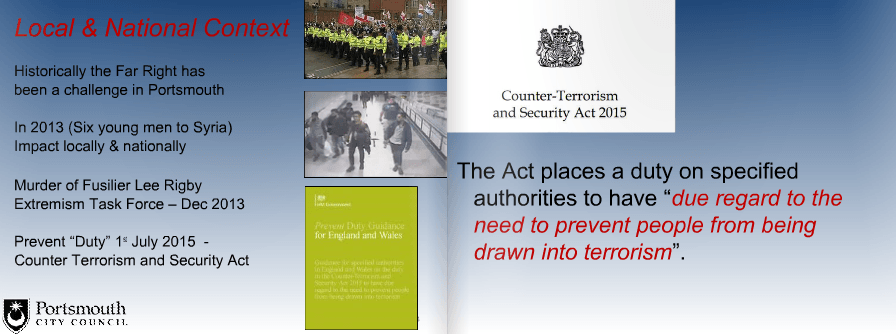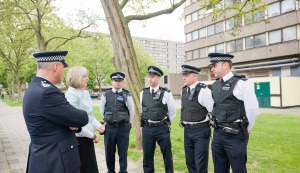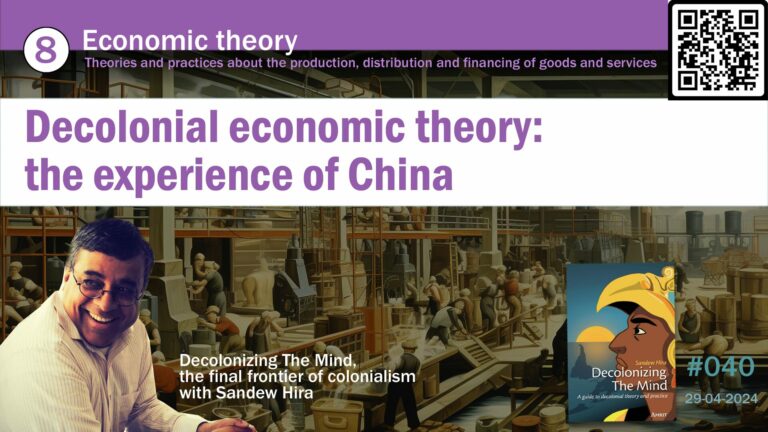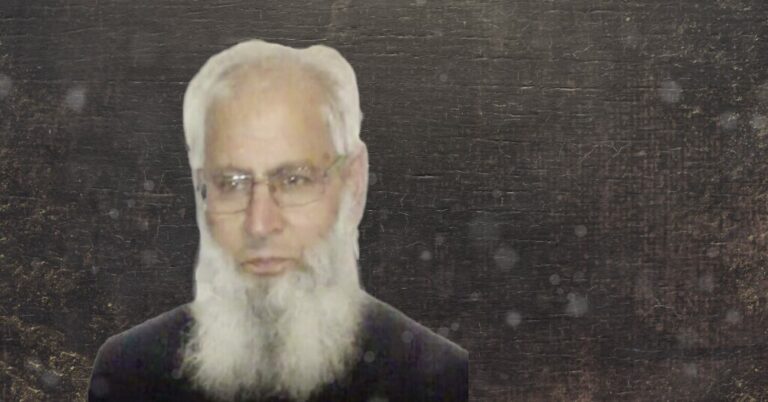ABOUT
The aim of this blog is to track how the government and local councils are implementing PREVENT, and to provide a resource for all those affected by the policy, and to help you identify your local Prevent officer, which third party organisations your council is consulting, and which projects in your area are Prevent-funded. We also want to expose the racist/Islamophobic nature of this policy and will demonstrate the way it is primarily being directed at Muslims (despite the token references to ‘far right extremism’ in the government guidelines). If you have any information that you think would be useful for us to publish, or if you are being subjected to investigation under the PREVENT umbrella please get in touch: mohammod@ihrc.org
INDEX
– Invasion of the PREVENT Officers
Invasion of the PREVENT Officers
IHRC was invited to speak at Portsmouth University’s Citizenship, Race And Belonging (CRaB) research network about the problems and racist practices instilled by Prevent.
During the Q&A three members of the audience revealed themselves to be involved with the implementation of Prevent in Portsmouth. One was Salam Katbi, the South West Prevent Regional Further Education/Higher Education Co-ordinator, Charlie Pericleous, the Portsmouth City Council’s Prevent Co-ordinator, and Superintendent Will Schofield, District Commander of the Hampshire Constabulary.
In addition to the interruption during IHRC’s presentation, these three officers sought to derail the conversation and disrupt proceedings by dominating the Q&A. The issues they presented were as follows:
- Positioning Prevent within the history of state-based racism in the UK (from colonialism to the MacPherson Report that condemned the Metropolitan Police as institutionally racist to the present day) is inaccurate because Prevent doesn’t target people on the grounds of race. But it does acknowledge that there are problems within Muslim communities.
The perpetual argument that Islamophobia is not racism is one that is always used by racists. The Prevent agenda has determined that there is something fundamentally wrong with Muslims. We know that Prevent strategy documents identify Muslims explicitly and that statistically the majority of those targeted by the agenda are Muslims. This sets up a conflation between extremists and Muslims.
With Prevent utilising the now-discredited conveyor belt theory that says those who engage in extremism are on their way to committing an act of terror, this means that Muslims are often deemed to be at risk of becoming terrorists. This of course is not true. There are no statistics to support such a claim and in fact we know that in the last five years less than 2% of terrorist attacks were religiously motivated.
The identification of Muslims as a problem in this way is based on negative and harmful stereotypes perpetuated by governments (the British one particularly) and media (often one and the same) and thus is a racist practice.
- Salam Katbi is a Syrian-born Prevent officer, and as a Muslim can say that Prevent does not target Muslims. Rather, it seeks to help Muslims who are at risk of engaging in extremism.
This is a strategy seemingly employed by local councils across the country, where Prevent officers are Muslim. This appears to have occurred following accusations that Prevent criminalises Muslim communities. Muslim Prevent officers are able to deflect such accusations by being living proof that they are not victims of the strategy, as well as making the strategy more palatable to those whom it is targeting.
It is an obviously ludicrous strategy; the few Muslims who represent the state saying Prevent is positive cannot possibly discount the overwhelming number of Muslim voices that argue it’s damaging effect on their lives. To suggest as such implies Muslims in this country are unintelligent and gullible and cannot form opinions for themselves based on their lived experiences.
- Far right extremism is also a problem within Portsmouth and Prevent is intended to help them too.
This is also a response to the accusation that Prevent criminalises Muslim communities. It is clear that this is often just lip service; while individuals engaged in far right extremism might be identified through Prevent, the wholesale targeting of entire communities does not occur in the same way it does for Muslims.
Muslim community groups, mosques, and families have been routinely pressured to take money and harassed into naming people who may be involved in terrorism (even if there is no evidence of this) in the 10 years that Prevent has been around. When challenged countless times by IHRC, Mr Pericleous could not identify any similar occurrences with white working class communities in his supposed bid to identify far right extremism. In desperation he mentioned the Respect project at Portsmouth FC, which on further investigation is actually about ‘educat[ing] young people with social, emotional and behavioural difficulties by raising their awareness of disability’ rather than addressing potential far right leanings.
IHRC does not think Prevent should target any community. Instead, it should be scrapped given that it is rooted in the fallacy of ‘problem’ communities, which fails to acknowledge the violence of the state (in both its foreign and domestic policy that marginalises and criminalises minority groups) as an oft-cited reason behind individual’s committing acts of terror.
- Channel is a voluntary referral programme to de-radicalise people.
Channel is ostensibly voluntary but with the pressure put on people to comply with the referral (through visits by Prevent and police officers to family, friends and schools/workplaces), it is hard to think of it as such. Additionally, we know that young people who are referred are often done so without parent/guardian consent. Therefore, despite it being voluntary in theory, in practice it is compulsory for many. On top of this, there are plans in the works for Channel to become a compulsory programme stipulated by law.
Prevent officers as state propagandists
These are all standard arguments that are used by Prevent officers and the strategy’s champions. They are repeated often and have little merit. What is interesting in this instance is that three of them – one a police officer no less – came to the event together with the intention of aggressively challenging what was being said. It is also clear that these were senior members of Hampshire’s (county) and Portsmouth’s (city) Prevent programme. It begs the question whether this is now part of their job description: to be responsible for pro-Prevent propaganda and attempt to subdue anti-Prevent sentiment. Given that Prevent officers in Portsmouth receive at least £40k+ in a government salary, it is clear that instead of spending counter-extremism funds on helping vulnerable people (purportedly Prevent’s agenda), the government is spending this on swaying public opinion that is decidedly anti-Prevent.
Portsmouth’s Prevent training
With this use of government funds in mind, it is also useful to look at the ways in which Portsmouth identifies risks for young people under the Prevent agenda. A presentation by Mr Pericleous (see screen grabs below) shows numerous images of ISIS and the attacks on 9/11 and 7/7. This flies in the face of the assertion that far right groups are just as much of a problem in Portsmouth and that Prevent officers are addressing it. This presentation is likely to be shared with public service providers who are responsible for identifying members of the public at risk of engaging in extremism. While there are references to the far right, the overwhelming message is that ‘Islamist extremism’ is the main threat, with the link between that and Muslims evident.
This goes to the heart of what Prevent actually is. For all the arguments otherwise, Prevent identifies Muslims as a problem and as potential threats, with officers needing to intervene before it’s too late. Mass surveillance and interrogation of Muslims has led to an overwhelming fear within our communities, very much in the tradition of how this government deals with minorities.




The Channel programme is the process by which the government tries to ‘de-radicalise’ you (whatever that means). It is part of PREVENT, and has been around since 2006.
Sounding ominously like a task the Ministry of Love would set itself, Channel involves a panel comprising local police, social services, PREVENT officers and more, interviewing the individual in question, and creating a programme for their own personal process of de-radicalisation. It is not clear what this looks like – most of those who have been through Channel are unwilling to talk about it due to fear and anxiety of what they have been through and what they and their families could be subjected to.
We do know however that police have frequented their homes; friends and relatives have been questioned; and they are coerced into attending de-radicalisation classes and workshops.
When someone is referred to the Channel programme it is not compulsory for them to participate, but the threat of the label ‘extremist’ is enough to encourage anyone’s engagement. This is particularly true of the young people this targets, many of whom come from low income families, and many of whom have parents who do not speak English, meaning they would rather comply than face further State harassment.
Although it is possible to refuse to engage with the Channel programme, we have been made aware of many parents not even being given the option of opting their child out because they have not been told their child is in it in the first place.
Figures show there has been an exponential rise in those who have been referred to Channel in the past few years. Between 2006 and 2014 (2014/15 are pending) there have been 3934 referrals. Of these, 777 were assessed to be vulnerable and therefore appropriate for the Channel process. That means 80% of those referred came under scrutiny and suspicion despite there being no evidence that they were at risk of being drawn into terrorism. It is difficult to overstate how this process effects families and communities involved. Many have suffered a great deal of anxiety and trauma at the hands of PREVENT and the Channel programme, with the knowledge that they are criminalised (or as the government puts it, they occupy the ‘pre-criminal space’) by virtue of being Muslim and by virtue of living in a PREVENT priority area. For many, it feels just a matter of time before they are targeted by these policies.
Year: 2006/07 || Referrals: 5
Year: 2007/08 || Referrals: 75
Year: 2008/09 || Referrals: 179
Year: 2009/10 || Referrals: 467
Year: 2010/11 || Referrals: 599
Year: 2011/12 || Referrals: 580
Year: 2012/13 || Referrals: 748
Year: 2013/14 || Referrals: 1281
Total Referrals: 3934
There is little to no breakdown of these figures into age group or racial or religious categories. We have submitted a Freedom of Information request from the National Police Chief’s Council who collate this data and will post the results when they come through.
However, we do know that over one-third of referrals since 2007 were of children under 18 years old. And between 2012 and 2014 at least 56% of referrals were Muslim. This figure could rise to 89% as the religion was not recorded for 33% of the referrals over those two years. Greater clarity on these is expected following the response to the FOI.
With PREVENT now a statutory duty on public service providers, Channel will certainly see an increased number of referrals. Given the climate of Islamophobia, those making the referrals will no doubt feel compelled to refer more Muslims to Channel, to be on the safe side. This inevitably creates deep divisions within communities, and a profound lack of trust for government and government-affiliated bodies.
PREVENT has been around since 2006 and has been implemented as part of the UK’s counter-terrorism measures. Since the outset the government’s counter-terror strategy has targeted Muslim communities as it is they who are perceived as a threat. Europe has constructed itself out of fear of Islam (see Ramon Grosfoguel for an academic interrogation of this), and has pitted itself in opposition to it. This historical narrative carries through to the present day with the UK’s incessant attacks (direct or indirect) on Muslim countries. But it is not just this; Muslims in western states are the enemy within and have been branded a suspect community because of any modicum of affiliation with the Islam ‘out there’ that Europe fears and loathes. (For more on this see IHRC’s Prevent page).
As a result, the UK has sought to monitor Muslim communities with increasing dexterity, and the newly passed Counter Terror and Security Act 2015 has made it a duty of all public service providers in the UK to track members of the public who may be at risk of being drawn into terrorism.
For the government, the individual(s) may be drawn to extremist ideologies/organisations, which leads to their radicalisation. This in turn risks their descent into terrorism. The aim of PREVENT is to stop them before they are drawn into extremism. This new PREVENT duty has allowed the government to recruit doctors, nurses, teachers, university lecturers, social service providers, and more to act as agents of the state security apparatus. They are legally required to monitor those for whom they are providing a service to determine whether they are at risk of engaging in extremism. If they are, they are referred to their local authority who will assess whether they need to be put through a de-radicalisation process (the Channel programme).
The government defines extremism as: vocal or active opposition to fundamental British values, including democracy, the rule of law, individual liberty and mutual respect and tolerance of different faiths and beliefs. Extremism can also be calling for the death of members of the British armed forces. Extremism can be violent OR non-violent.
This definition catches within it those who think or say things in opposition to the State. Additionally, the theory that those who are radicalised (have radical ideas) are then capable of committing acts of terrorism is one that has been debunked by its original proponent (see Marc Sageman’s The Turn to Political Violence) and is increasingly delegitimized in academic circles.
The State’s attempt to expound on theological arguments within Islam as a way of getting to the crux of the rise in terrorism also misses the point. All those who have been convicted on terrorism charges have cited the UK’s foreign policy as a trigger for their anger. As Arun Kundnani puts it, a State that commits acts of violence inevitable begets violence at home (as has been historically proven). It also disregards the socio-economic status of those individuals. The State refuses to consider these as contributing factors because it would demonstrate that the State itself is the ultimate cause of any acts of terror against itself.
It is clear from the above definitions and the government’s strategies that this is not about targeting the roots of terrorism but demonising and criminalising a minority community.
{jathumbnailoff}







